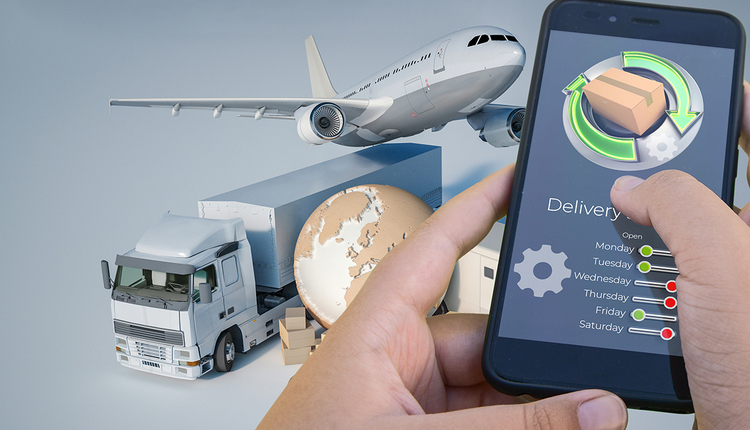With more than 220 countries and territories across the globe, changes are inevitable. Laws and regulations constantly change, and new ones are often enacted. The last few years brought many changes, and the changes will continue. Technology will continue to create other advancements. As we look at what is, and might be, coming in the next few years, keep in mind that each country and territory has its own unique laws and regulations, even within trade blocks like the EU.
Technological Advancements in Addressing and Routing Logistics
Technology is creating changes in addressing and in routing logistics as Geographic Information Systems (GIS) link a unique identifier to an individual and to one or more geographic locations for delivery. Recently, mobile telephone numbers and numeric Personal Postal IDs have been introduced as postal addresses in sub-Saharan African and other countries. Other countries are interested in this development. The complete address is the addressee’s name and the town of the local post office. Mailers should prepare for these, and other unusual, addresses. Whether the US and other countries will accept these addresses as sufficient to meet requirements for “know your customer” and export compliance regulations is untested, and current or future privacy regulation conflicts are unknown. PUDO (Pick-Up-and-Drop-Off) points and parcel locker IDs used as addresses can present the same challenges.
The same GIS-enabled database can be used for routing with precise and up-to-date maps. That allows for more dynamic routes, which are more time- and fuel-efficient. The disadvantage of dynamic routes is they are not familiar to the person making the deliveries, an advantage of fixed routes. The solution between the dynamic and fixed routes may lie with autonomous vehicles, with the route (and “driving”) being handled by IA and with a person handling delivery. More autonomous vehicles will be on the roads, in the middle mile, but not in populated areas. Arial drones are unlikely to be used in populated areas, but are already being used in the middle mile and in deliveries to sparsely populated areas. More of this will be seen going forward, but will require changes to laws.
Gig delivery is being tested for the final mile in many areas. It’s likely to work well in some places but fail in others. Gig delivery is used in some developing countries for the middle mile where, for example, a trucker will take packages for local residents to be picked up at a general store along with a delivery of goods. That model of sending packages closer to their final destination may have some applications for moving packages internationally into the destination country or region when sending smaller volumes.
Tracking, Returns, and Increased Scrutiny
International tracking and returns remain problematic. Both are currently dependent on people—delivery agents or customers. Tracking is not yet fully automated, and may depend on satellite access, battery power, and potentially fallible human scanning. International returns have all the problems of domestic one, and then you have to add in the paperwork and regulations involved in crossing borders.
Cross-border commerce is subject to increasing inbound and outbound scrutiny, requiring more and more information. (The US has mandated increased inspection or certification of items on non-passenger flights.) This increase may again lead to privacy issues and to challenges for companies to store and document the information. Some countries have declined to provide all the AED information within the postal network because it is not required by a treaty or other inter-governmental agreement. Private carriers must meet the laws and requirements of both the sending country and the receiving country.
This increased scrutiny has two effects. First, entry ports and customs officials have challenges with storage space and staffing, leading to delays. This will resolve itself as agencies and systems adjust to the new reality. Second, more scrutiny seems to be leading to more tax assessments and to more returns. Any country has the right to open any item for customs inspection and to re-value the contents. (Downward is unlikely.) With inspections of all items because of duties and taxes for any non-zero value, more reassessments are likely. In EU countries, postal operators are charging fees for processing and delivery when customs duty and value-added tax (VAT) are due on an item. Consumers, unwilling to pay higher taxes and fees, are more likely to return items.
The requirement by some EU countries that the EU IOSS identification number appear on paper customs forms led to some fraudulent use of IOSS tax numbers. Companies should monitor their accounts carefully and be prepared to challenge fraudulent charges. Whether countries are motivated by protectionism, security, or revenue production, or some combination of them, matters as these regulations are enforced. The reasons behind and the objectives of these policies will dictate how strictly they will be enforced and whether there will be modifications easing or tightening them over time.
Other Important Considerations
Third-party logistic providers (3PLs) and other service providers can help mitigate the problems companies face with processing, paying, and tracking taxes. While they can provide assistance, the owner of the package has ultimate responsibility for the information provided to US and other government authorities — USPS, US Customs and Border Protection, foreign customs, and tax agencies — and can face legal sanctions for non-compliance. Carriers — express companies, airlines, shipping companies — face sanctions for non-compliance. (Postal operators are in a different situation because of treaties regulating them.)
Accepting non-banked payments can also expose companies to legal problems. Banked payments are those that go through banks — credit cards, bank transfers, checks (or cheques), etc. Non-banked payments do not use traditional banks and include payment processing companies (e.g., PayPal), cryptocurrencies, etc. The use of non-banked payment methods has been increasing for the last decade, particularly in less developed regions with less bank access and among those avoiding taxes, committing fraud, or laundering money. These types of payments will continue to increase, as will the increase in digital currencies and the move away from cash. The legalities vary from country to country. A decision on whether to accept, or make, non-banked payments, and which ones, should be discussed with your firm’s accountants and attorneys.
International commerce is subject to a number of multilateral treaties and agreements originating from international organizations. All has not been smooth lately: the World Trade Organization (WTO) has had no successful trade negotiations in about 20 years, and the Universal Postal Union remains unable to move forward on basic reforms. Trust between countries, especially the US as a reliable partner, has gone down over the last five years. While the international organizations have had some rocky years recently, the agreements affecting international package shipping, particularly the IATA regulations and customs agreements, will continue to be accepted and adhered to widely.
Worldwide, with an overall vaccination rate of less than 20%, COVID will continue to be a problem into at least 2024 with continuing disruptions of transit and delivery. An increase in general restiveness, from demonstrations to increases in crime to coups d’état that have occurred recently worldwide, show little sign of decreasing, and may well increase with continued dissatisfaction with COVID issues and economic troubles. The dependability of all those grids for electricity, for Wi-Fi, for telephone communications, and other services is increasingly fragile. Awareness of the issues and contingency planning are needed along with back-ups and security precautions.
Merry Law, President of WorldVu LLC, consults with organizations on international addressing and databases as well as on postal and delivery issues. She is editor of the authoritative Guide to Worldwide Postal-Code and Address Formats and author of Best Practices for International Mailings. She frequently writes and speaks on international addressing and mailing, bringing the understanding of an international mailer of letters and packages and a consultant to other mailers. Merry is a member U.S. International Postal and Delivery Services Federal Advisory Committee and the USPS Mailers Technical Advisory Committee (MTAC) and participates with the Universal Postal Union Addressing Work Group associations.
This article originally appeared in the 2021 International issue of PARCEL.



















